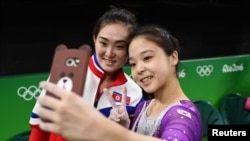There was a rare moment of inter-Korean friendship captured at the Olympics in Rio de Janeiro when North and South Korean athletes took a selfie together.
Photographers at the Olympics caught the two smiling gymnasts, Lee Eun-ju of South Korea and Hong Un Jong of North Korea, taking a picture of themselves with a phone during a practice session before competition began.
The photo has gone somewhat viral on the Internet and is being roundly praised for embracing the Olympic goals of building peace and understanding.
On Twitter, Eugene Cho, a Korean-American whose parents were born in North Korea tweeted his optimism.
Both Political scientist Ian Bremmer with the Eurasia Group and the state-run China Daily newspaper tweeted the same comment.
Even Glamour, an American fashion magazine shared the photo and tweeted "These two deserve a gold medal for diplomacy."
Divisions
The inter-Korean friendship selfie in Rio stands in contrast to examples of bitter divisions between other adversaries.
Serbian officials reportedly told their athletes not to appear with their counterparts from Kosovo. Relations between the Balkan neighbors have remained tense since Kosovo gained its independence from Serbia in 1999.
And the Lebanese Olympic team refused to share a bus with their Israeli counterparts on the way to the opening ceremony.
This moment of inter-Korean Olympic friendship comes at a time of deep division and high tensions between the governments in Seoul and Pyongyang.
Sports diplomacy
Following North Korea’s fourth nuclear test in January South Korea terminated virtually all business ties, exchanges and communication with the North.
Yoon Kang-ro, the President of the International Sport Cooperation and Diplomacy Institute in South Korea says the Olympics offer the two Koreas a chance to find some common ground.
“One photo doesn’t make any good progress, but I think it’s a good starting point,” said Yoon.
Yoon notes that there have been other past examples where sports diplomacy was tried, and in some cases it helped improve relations for a while, and in other cases it did not.
North Korea boycotted the 1988 Olympics in Seoul after the International Olympic committee refused Pyongyang’s demand to co-host the games.
But in the 2000 Olympics in Sydney Australia, the two Koreas marched together in the opening ceremony.
The cooperation during the Sydney games reflected the strong emphasis on engagement made by the late South Korean President Kim Dae-jung, who initiated assistance and cooperative projects to build trust with the North under his Sunshine policy.
In the last decade, inter-Korean relations again deteriorated over the North’s defiant pursuit of nuclear weapons and continued provocations.
Still Yoon says sports can provide an opening for dialogue when other avenues have been shut down.
“Sports transcends differences of political, religious, cultural, all other barriers. Sports is always creating a barrier free scene,” he said.
In 2014 a high level North Korean delegation visit to the Asian Games held in South Korea ended in some informal talks.
And if the North participates in the South Korean hosted 2018 Winter Olympics, Yoon says both sides will have to engage and cooperate in ways that could open up future channels of communication.
Youmi Kim in Seoul contributed to this report.




